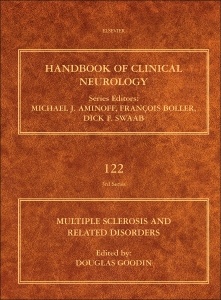Description
Multiple Sclerosis and Related Disorders
Handbook of Clinical Neurology Series
Language: English
Subject for Multiple Sclerosis and Related Disorders:
736 p. · 19.5x26 cm · Hardback
Description
/li>Contents
/li>Readership
/li>Biography
/li>Comment
/li>
Multiple Sclerosis (MS) is generally understood to be an inflammatory autoimmune disease of the central nervous system. While we still are not certain of the root cause of MS, research results suggest that unknown environmental factors and the presence of specific genes seem the most probable targets. MS causes an inflammatory response in the central nervous system leading to neurodegeneration, oligodendrocyte death, axonal damage, and gliosis. Over the past five years ongoing research has greatly expanded our understanding of the pathogenesis of MS, detailed insight into the epidemiology and genetic factors related to MS, the introduction of new technologies and tests to better diagnose and predict the future course of the disease and the introduction of new treatments targeting MS. This collection of review chapters provides a comprehensive reference into the science and clinical applications of the latest Multiple Sclerosis research and will be a valuable resource for the neuroscience research community and the clinical neurology community of researchers and practitioners.
Section 1 Pathogenesis 1. Immune regulation of multiple sclerosis 2. Neuropathology of MS 3. The good and the bad of neuroinflammation in multiple sclerosis 4. Demyelination in multiple sclerosis 5. Axonal loss in multiple sclerosis: Causes and mechanisms 6. Insights from magnetic resonance imaging 7. Infections and multiple sclerosis 8. The experimental autoimmune encephalomyelitis (EAE) model of MS: utility for understanding disease pathophysiology and treatment
Section 2 Epidemiology and genetics 9. Multiple sclerosis genetics 10. Genetics of primary progressive multiple sclerosis 11. The epidemiology of multiple sclerosis: insights to disease pathogenesis
Section 3 Diagnosis and disease course 12. Multiple Sclerosis: Diagnosis, differential diagnosis and clinical presentation 13. MRI mimics of multiple sclerosis 14. Diagnosis of multiple sclerosis 15. Clinical course of multiple sclerosis 16. Early prognosis of multiple sclerosis 17. Clinical outcome measures in multiple sclerosis 18. MRI outcomes in the diagnosis and disease course of multiple sclerosis 19. Multiple sclerosis in children
Section 4 Treatment 20. Clinical trials in multiple sclerosis 21. Glucocorticoid treatment of multiple sclerosis 22. Disease modifying agents in multiple sclerosis 23. Immunosuppressive treatments in multiple sclerosis 24. Symptomatic treatment and management of multiple sclerosis 25. Future treatment approaches to multiple sclerosis
Section 5 Other demyelinating diseases 26. Neuromyelitis optica (Devic's syndrome) 27. Acute disseminated encephalomyelitis and other inflammatory demyelinating variants 28. Acute inflammatory myelopathies
Section 6 Capita selecta 29. Clinical neurophysiology of multiple sclerosis 30. Cerebrospinal fluid analysis
Neuroscience research workers
- A comprehensive tutorial reference detailing our current foundational understanding of Multiple Sclerosis
- Includes chapters on key topics including the genetics of MS, MRI imaging and MS, and the latest treatment options
- Each chapter is translational and focuses on current research and impact on diagnosis and treatment options
These books may interest you

Multiple SclerosisA Mechanistic View 126.84 €



